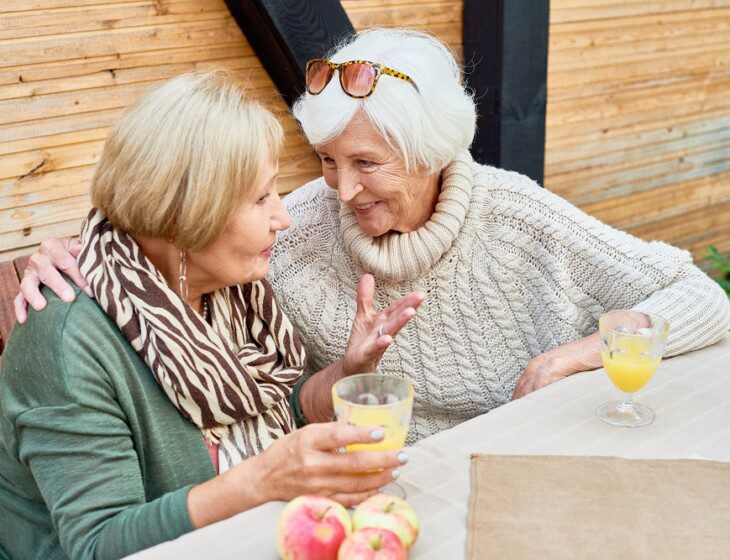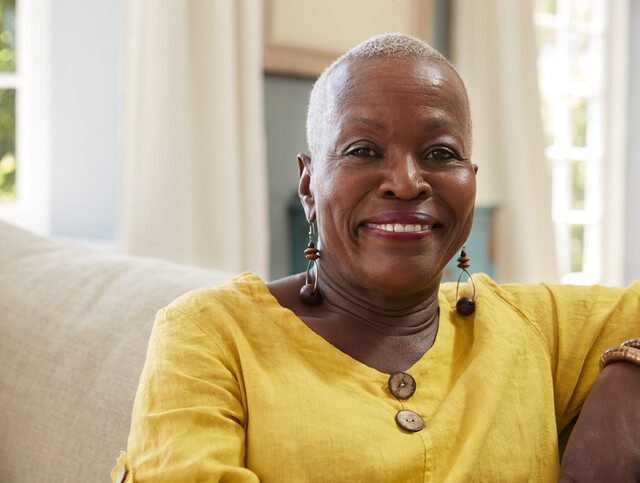Why does it feel more difficult to make friendships later in life? More than two-thirds of adults over 45 say they feel lonely, and nearly a quarter of those 65 and older report feelings of social isolation.
There are many reasons that we seem to have fewer friendships later in life. Our social networks are more geographically dispersed today, which means friends move away for jobs, school or to be nearer to other family members. Being older also means that we have more responsibilities and fewer opportunities for engaging in activities that may lead to new friendships. Sometimes the social clubs and activities that we enjoyed when we were younger simply no longer fit into our schedules.
This is unfortunate, as research shows that creating and maintaining positive friendships can be just as important to our health and longevity as regular exercise. Here’s why friendships are good for us, and suggestions for how to make more of them later in life.
The Impact of Friendships on Our Health and Well-Being
From stress reduction to improved cognitive health, there are a range of benefits for those who prioritize and maintain positive friendships. This is likely because we are social creatures that value a sense of belonging. Until very recently in our history, survival required the ability to successfully manage and navigate relationships within small groups.
In a sense, we may be hardwired to seek out close relationships. One study found that adults who felt a sense of belonging in a group—whether that was a social club, sports club or church organization—were less likely to struggle with depression and suicidal thoughts.
Friendships May Reduce Dementia Risks
Establishing and maintaining large social networks has been found to protect older women from the effects of cognitive decline, including reducing the risk of dementia. The exact reason for this is not known, but it may be related to the tendency for those with close friends to engage more often in conversation. In one study, those who said they had at least one person in their lives who they felt was a good listener were more likely to display higher levels of cognitive resilience.
Friendships and Life Expectancy
The people around us can have a profound effect on our habits—good and bad. Those who surround themselves with those who make healthy choices are more likely to make similar choices (and vice versa). Having close friendships also makes it more likely that a person will be called out for unhealthy behaviors, such as drinking or smoking too much. Knowing that someone cares about our well-being can make us more motivated to take care of ourselves. Better habits also can lead to increased life expectancy. This may be why strong social support has been found to increase survival rates by over 50%.
Friendships and Heart Health
Stress can take a toll on the body, producing both physical and mental distress that prematurely ages us. This impacts numerous systems in our bodies, from our blood pressure to our immune systems. In addition, a recent study found that students who successfully integrated socially into a new environment experienced an increase in heart-rate variability. Those with lower heart-rate variability are at greater risk of cardiac diseases. This effect can add up over the years, leading to compounding effects.
How to Make Friends Later In Life
Now that you know just how important it is to make friends later in life, how can you go about creating these crucial new relationships? The best way to make friends is by engaging in pursuits that you enjoy with other like-minded people. This shared passion ensures that you have something to talk about; a connective starting point for a future friendship.
Make Time for Hobbies
Most of us find that there’s a hobby or activity we used to enjoy that fell to the wayside at some point. Try taking an adult or continuing education class in art, pottery, history, or another subject that you’ve always been interested in. Many educational institutions offer discounts to older adults, and may even let you audit a class for free. This not only gives you an opportunity to connect with others, but can be personally satisfying as well.
Volunteer for Causes You Care About
Call up the community organizations or charities that you support or feel passionate about and ask if you can volunteer your time. These organizations are always looking for extra support. They can also offer a variety of tasks to choose from, whether it be stuffing envelopes, helping to clear green space or sorting charity items. Find a place to volunteer where your skills and interests meet.
Focus on Existing Friendships
Sometimes we can overlook opportunities to expand our friend network that are literally right in front of us. Try inviting a friend to enjoy a picnic, cultural event, or museum tour with you and suggest they bring a friend that you don’t know. You can also get into the habit of daily walks through your neighborhood or community and start saying hello to those you meet. Daily interactions can add up and bloom into friendships.
Join a Senior Living Community
Senior living communities like Village on the Green offer numerous ways to extend your social network. Many seniors find that it’s like living on a college campus again, or going on a perpetual cruise. There is always something new to do and someone new to meet.
However, to take full advantage of all this style of living has to offer, you will need to make an effort. Here are some suggestions on getting started:
- Make dining a social event. The community dining venues are a great way to meet new people. If you find approaching other tables intimidating, ask a friend or family member to join you for a few meals. You can introduce yourselves to others together. Remember that many older adults are also struggling to make new connections. You might be doing someone else a favor by making the first introduction!
- Fill your social calendar. One of the benefits of living in a senior community is the access residents have to a wide range of activities, from group outings to fitness and art classes. Ensure that you take advantage of these opportunities, not just for the experience itself, but also to connect with others who share the same passions.
- Connect with new residents. We all know what it’s like to be new to a neighborhood, a new school or new church. Whether you have been at a community for some time or have just joined, a little kindness and compassion toward other new residents can go a long way. Seek out new residents when they move in and ask them to join you for a meal, a stroll or an activity later in the week after they are settled in.
Explore New Friendships at Village on the Green
At Village on the Green, we offer residents numerous opportunities to learn, play and grow. Nestled among 80 acres of secluded serenity, this vibrant community offers all the benefits of nearby Orlando attractions and dining options without the hustle and bustle of the big city. See what it’s like to have it all in this exquisitely landscaped senior living community full of warm, welcoming residents and supportive team members.
Contact us to discover more about this exceptional resort-like community.


